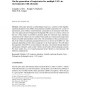Free Online Productivity Tools
i2Speak
i2Symbol
i2OCR
iTex2Img
iWeb2Print
iWeb2Shot
i2Type
iPdf2Split
iPdf2Merge
i2Bopomofo
i2Arabic
i2Style
i2Image
i2PDF
iLatex2Rtf
Sci2ools
134
click to vote
JIRS
2010
2010
On the Generation of Trajectories for Multiple UAVs in Environments with Obstacles
Abstract This paper presents a methodology based on a variation of the Rapidlyexploring Random Trees (RRTs) that generates feasible trajectories for a team of autonomous aerial vehicles with holonomic constraints in environments with obstacles. Our approach uses Pythagorean Hodograph (PH) curves to connect vertices of the tree, which makes it possible to generate paths for which the main kinematic constraints of the vehicle are not violated. These paths are converted into trajectories based on feasible speed profiles of the robot. The smoothness of the acceleration profile of the vehicle is indirectly guaranteed between two vertices of the RRT tree. The proposed algorithm provides fast convergence to the final trajectory. We still utilize the properties of the RRT to avoid collisions with static, environment bound obstacles and dynamic obstacles, such as other vehicles in the multi-vehicle planning scenario. We show results for a set of small unmanned aerial vehicles in environments...
Related Content
| Added | 28 Jan 2011 |
| Updated | 28 Jan 2011 |
| Type | Journal |
| Year | 2010 |
| Where | JIRS |
| Authors | Armando Alves Neto, Douglas Guimarães Macharet, Mario Fernando Montenegro Campos |
Comments (0)

